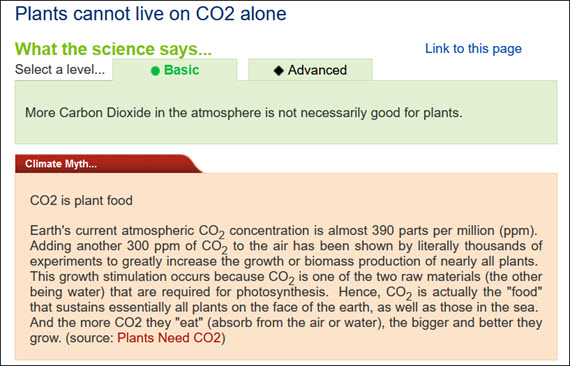At a glance - Plants cannot live on CO2 alone
Posted on 2 January 2024 by John Mason, BaerbelW
On February 14, 2023 we announced our Rebuttal Update Project. This included an ask for feedback about the added "At a glance" section in the updated basic rebuttal versions. This weekly blog post series highlights this new section of one of the updated basic rebuttal versions and serves as a "bump" for our ask. This week features "Plants cannot live on CO2 alone". More will follow in the upcoming weeks. Please follow the Further Reading link at the bottom to read the full rebuttal and to join the discussion in the comment thread there.
At a glance
Have you ever tried growing vegetables in a container? If you are a newbie who wants to give it a try, you will quickly become familiar with the following point. With many species and varieties, it's a lot easier to grow them in a well-tended bed than in a bucket.
Most vegetables grow best in a bed of mature, nutrient rich soil that has had regular addition of compost over the years. The only things you need to do are watering them when it's dry and picking off the slugs. But in a bucket, even with a lot of compost from the garden centre, plants often struggle without the help of regular feeds of liquid additives to boost things along. Such feeds include various nitrogen compounds, phosphorus, potassium, iron, zinc and other essential trace-metals.
The purists among us prefer not to expend hard-earned cash on such feeds because they are expensive - defeating the whole object of grow-your-own which is to produce good vegetables cheaply. Managing that precious commodity, topsoil, so that it is productive year upon year is what we do instead. To be a successful gardener, looking after your soil is probably the most important skill to gain and apply.
But what about the person who thinks like the myth-provider in the box above? They seem to know about photosynthesis. Photosynthesis is the process by which plants extract carbon dioxide from the atmosphere and, using the energy received from sunlight, make it react with water in their cells. The products of that reaction are sugar and oxygen. Oxygen is released back to the atmosphere and the plants stash away the reserves of sugar within their stems, tubers or roots, depending on the species. But our myth-provider seems to think that because photosynthesis only requires CO2 and water, then high levels of both are all that's required for happy plants. How will their garden grow?
Well, basically they are going to find their attempt to grow vegetables immensely frustrating. Increasing the plants' CO2 supply alone and ignoring all the other essential compounds for plant health is a shortcut to unhealthy crops - if they produce any appreciable crop at all. That's the difference between being a good gardener and a hopeless one. The good gardener acts on the basis of the whole big picture, not just one part of it.
Please use this form to provide feedback about this new "At a glance" section. Read a more technical version below or dig deeper via the tabs above!
Click for Further details
In case you'd like to explore more of our recently updated rebuttals, here are the links to all of them:
If you think that projects like these rebuttal updates are a good idea, please visit our support page to contribute!































 Arguments
Arguments































I think this explainer needs a bit of work.
In the first place it’s not necessarily true that plants in containers struggle without expensive liquid feeds. Provided the mix of soil and organic matter is adequate, in a reasonable sized pot, most vegetables can be grown quite easily, with some additional fertilizer as required. This can be a simple NPK fertilizer dissolved in water and will cost a few pennies per application.
https://www.rhs.org.uk/vegetables/containers
https://www.rhs.org.uk/herbs/growing-bags
On the other hand, growing in some soils can be problematic, in some/many locations they may be sandy/compacted/acidic etc. and will need considerable work to improve.
And while it’s true that atmospheric CO2 increases have led to ‘global greening’ which has helped ameliorate warming (https://earthobservatory.nasa.gov/images/146296/global-green-up-slows-warming) trying to figure out how things will continue in the future turns out to be very complicated (https://www.nature.com/scitable/knowledge/library/effects-of-rising-atmospheric-concentrations-of-carbon-13254108/ ; https://ripe.illinois.edu/press/press-releases/photosynthesis-unaffected-increasing-carbon-dioxide-channels-plant-membranes ; https://botany.one/2021/08/rising-carbon-dioxide-concentrations-are-making-the-worlds-most-destructive-toxic-weed-more-toxic/ )
Elevated CO2 has a strong impact on the other aspects of C3 plants' physiology, especially nutrient metabolism which can be attributed to:
• increase in the biomass of plant leaves results in a lower mineral concentration via a dilution effect,
• reduced transpiration cause reduced mass flow in the soil, and hindered nutrient translocation via the xylem sap,
• reduced photorespiration & production of NADH, leading to a decreased NO3 assimilation,
• disturbance in the regulations of root N uptake and signaling.
https://www.cell.com/trends/plant-science/fulltext/S1360-1385(22)00247-3
Elevated CO2 has all sorts of effects, but I think you have read this at-a-glance with too much expectation. It's designed to be highly accessible and readers who want more will go on to Further Details, or possibly Intermediate or Advanced.
Grew Swiss Chard in big pots this year (with soil and 'organic standard' bagged compost) and had to really coax them, indeed requiring such a fertilizer as you describe. Some years ago I had a garden swap (for about 8 years) and there when I started out the 'soil' was sharp slate scree with a bit of interstitial leaf-mould. The solution was to dig out a decades old lambing barn (stratified dry sheep poo almost like chipboard!) to start things off - but also because I live near the coast, working a few tons of seaweed a year into the beds, after every Atlantic storm. That made a huge difference. In the best year some of the chard plants were close to a metre high! Never had to add anything else. Just one man's experience.....